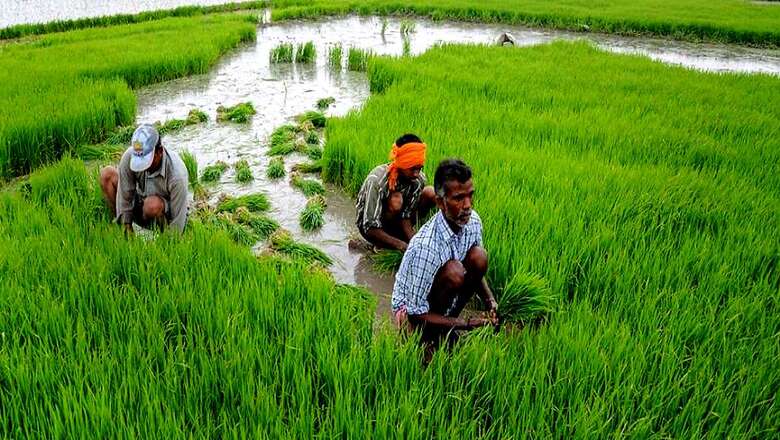
views
Punjab has been an economic failure.
Data over the last several years shows the agricultural growth rate has been less in Punjab than other parts of the country. Now this focus on rice and wheat has not been good for Punjab. And Punjab has not diversified away from rice and wheat.
Rice requires a lot of water and Punjab doesn’t have it. The water table has gone down and the environment has been spoilt. But farmers do it because they think they get an assured price and they are not willing to change.
Punjab has been an economic failure, because even though in the past 10- 15 years it has had the highest per capita income because of agriculture, it hasn’t made the transition to an industrial or service economy to provide jobs for young people.
Punjab benefits the most from the minimum support price (MSP) and government procurement. Then comes Haryana. But Punjab is not the largest producer of rice and wheat.
Uttar Pradesh, West Bengal, Madhya Pradesh produce more rice and wheat than Punjab. But the largest procurement, about 85- 90 per cent, happens in Punjab. Why is that? Because the Green Revolution happened there first and then it spread. The government set up all infrastructure and the government has been raising the prices.
So a large number of young people, children of farmers, want to emigrate to Canada and other places because there are no jobs. Punjab has not invested in higher education, not invested for industries to grow. It has not created any service industry that depends on higher education.
So it has been a classic case of an economy that’s not been able to make the transition to a manufacturing and service economy.
When you talk of any investment anywhere, not many talk of Punjab. So Punjab’s share in India’s GDP has been coming down and it has not made a transition.
There is a lot of frustration among young people that there are no jobs. But for jobs to come they have to create an industrial base and put money into infrastructure, put money into higher education to create human capital.
And that they are not doing.
Now the farm laws give the freedom to sell to whoever they want and wherever they want. It does not prevent them from going to the mandi and selling at MSP. Nothing in the bill says they can’t do it.
Government can’t run away from MSP
The Government of India is committed to MSP for a very important reason. It has a commitment under the Food Security Act to give ration to 80 crore people, and without procurement it can’t do this.
Now if the farmers have any concerns, they can talk to the government and the government has said it will look at the issues and amend the laws where necessary. Now they say MSP has to be put into the law. Why should it be put into the law? MSP has been there for the past 35 years and it has worked very well.
There is no need for the law because the prices keep changing twice a year. The government has already made a commitment. There is no need for a law.
All that the Centre has said is, the restrictive practices will not prevent farmers from selling outside. It has given freedom to the farmers.
The farmer does not have to sell outside. He can go to the mandi and sell. Nobody is preventing him.
Then the government brought in contract-farming laws to protect the farmer. There has been contract farming in Punjab for the past 15 years. Punjab has a law for contract farming.
The new law only made sure we have one single law across the country which will protect the interests of the farmers. That by contract farming no land of the farmer is affected. That by contract farming you have to buy at the price you have committed. You can’t back out. You have a redressal mechanism.
And then the Essential Commodities Act was amended, to ensure free flow of goods all over. Because using this Act, traders would corner commodities like tomatoes and onions and potatoes, set off the market in times of shortage, and raise prices. So farmers do not benefit, because they still have to go to the mandi and accept lower prices even if they get better prices outside.
Now if the farmers feel it is not to their benefit, instead of protesting they can go to the government and the government can say it will look into all the questions.
India is the second largest producer in the world, and the government procures about 80 million tonnes of rice a year. No corporate is going to buy that much. Even if they buy, there is no market. Eighty per cent of the people get food through rations. All these fears about corporates coming – what corporates will come? They don’t have the capacity, they will never have the capacity, and nobody is forcing the farmer to sell to any corporate.
Nothing is being forced under the law for the farmers to do anything that they don’t want to do and to do anything that they have not done before.
Now if you feel concerned about all that, you can tell the government to amend the law.
Instead, a small number of people, maybe 1,00,000 to 1,50,000 are blocking all the roads, leading to an economic blockade.
The solution is very clear. The solution is, they must sit down with the government and express all their fears. And the government has said we will amend it.
Subsidies exist, subsidies will continue
Let me tell you how agriculture is subsidised.
Fertilizer subsidy is Rs 75,000 crore a year. Food subsidy is Rs 2 lakh crore a year, of which half goes to marginal farmers.
Farmers get free power everywhere, free water is given. Then they get interest-free loans. About Rs 12 lakh crore of loans are given, Rs 6-7 lakh crore are given at 2-3 per cent interest. The Government of India pays 5 per cent. That is about Rs 50,000 crore.
They are getting all subsidies; subsidy is continuing. Nobody is talking about the need to remove it. And who is paying for it? The taxpayers. If you get a salary of Rs 5 lakh, you pay tax. If a farmer gets 1 crore, he doesn’t pay tax. Two to three per cent farmers are very rich. Why should they get income tax benefit?
Farmers have been mollycoddled. But a small section of farmers have cornered all the benefits. Now they are agitating.
The government said it will give it in writing that MSP will not be removed. If the government tomorrow withdraws MSP, then you go on an agitation.
Yes, farmers should get a good price. On that, there is no doubt. How will farmers get a good price? When all of us pay a good price.
One basic thing is, we as consumers always pay a high price. The problem is the farmers are not getting the same price. They are getting only 25-30 per cent. That is because there have been restrictive practices which prevent them from selling.
How start-ups have opened up markets
Today there are 600 agri start-ups in India. Wherever they buy, they connect farmers to the market. Farmers are getting 25-30 per cent more. The data on this Is very clear. They are paying them more money and giving them money the next day.
So if farmers are connected to the market, they will get more money. They won’t have to go to the mandis. If they get better prices at the mandis, let them sell there. If they get better prices outside, let them have the freedom to sell.
The mandi system is not going away. So they should have the freedom: like we all have the freedom to earn our living, they should also have the freedom to sell where they want.
Role of states
State governments should invest. Agriculture is a state subject, but which state government is investing? Telangana has not invested and it is becoming the second largest producer of rice. Madhya Pradesh is a much better agriculture producer than Punjab; it has grown at 15-16 per cent a year for the last ten years. They are the biggest success story for agriculture in the last decade. So other states have done well, but Punjab has been an economic failure. They can’t produce anything more as the land is limited, productivity is high. What more can they produce? They must diversify.
All over the country, all grains are only about 40 per cent of the total agricultural output, and the share is coming down. Milk is getting bigger, meat and fish are getting bigger, fruits and vegetables are getting bigger. So the share of grains is coming down, because people are also eating less cereals. So, India is surplus in cereals for the past 5 years.
We are surplus, then why should we buy so much? We can’t keep on buying, if it’s not getting consumed in India. So why should that be subsidised when it’s not being consumed? It is a mess and that’s why this law is important, to give farmers the freedom and the law gives farmers a lot of freedom, without taking away anything that they are doing right now.
Farmers from other parts of the country are not protesting. Why? Because they don’t have procurement at all. Why will they protest? For them, it is all very strange. A small number of farmers are protesting and because you are in Delhi, it is being blown up.
I think that’s why all of us have to look at the issue and say let us sit across the table, tell us your concerns and address your concerns. But if you keep saying “till you remove the three laws we will not go home”, then what is the point. The laws are made by Members of Parliament, made in Parliament, and they are the right people to make the law.
Yes, if we don’t like that law, we can say so, because we are a democracy. But you cannot say do the law like the way I want. Those groups of farmers cannot say the law should be what they want. What about the rest of the farmers? Why are you denying them their freedom?
The right thing would have been, if Punjab does not want this law, let it pass it in its legislature and continue to suffer. That’s fine. Maybe the government should come out and say Punjab doesn’t like all this, let it not implement this. Let the rest of the country implement it. Let the rest of the country prosper, Punjab will remain where it is. The central government should say that the Punjab assembly has passed the law, the President will give the assent. Don’t prevent others from enjoying their rights.
India should diversify, export more
India should start exporting a lot of its food grains. But exporting can only happen if the crop is competitive globally. Today, because of the pandemic, there is a shortage of rice. A lot of rice is getting exported from India. China is also buying because there is a shortage around the world. The Chinese had floods and they are running out of food. Indian wheat is very expensive because the MSP is higher than the global price.
India needs to create a consistent export market for its grains. Because India can feed half the world if our productivity is good. We have the largest quantum of arable land in the world, the second largest quantum of irrigated land.
Secondly, farmers should diversify away from cereals in Punjab, which is a developed state, and produce fruits, vegetables and milk products, and other things. India alone produces 7 lakh crore litres of milk; it is the largest producer of milk. And the milk cooperatives give a good price.
India imports Rs 5- 10 thousand crore worth of exotic fruits a year. Why should we import if we can grow them here and become a big exporter? Punjab should diversify, but it doesn’t want to diversify. And they must cut down agricultural production and give the land for industries, because how will their children get jobs?
But these laws do not take away your rights, they only expand your rights. How can it impact you negatively?
(As told to Deepa Balakrishnan in Bengaluru.)
Read all the Latest News, Breaking News and Coronavirus News here


















Comments
0 comment